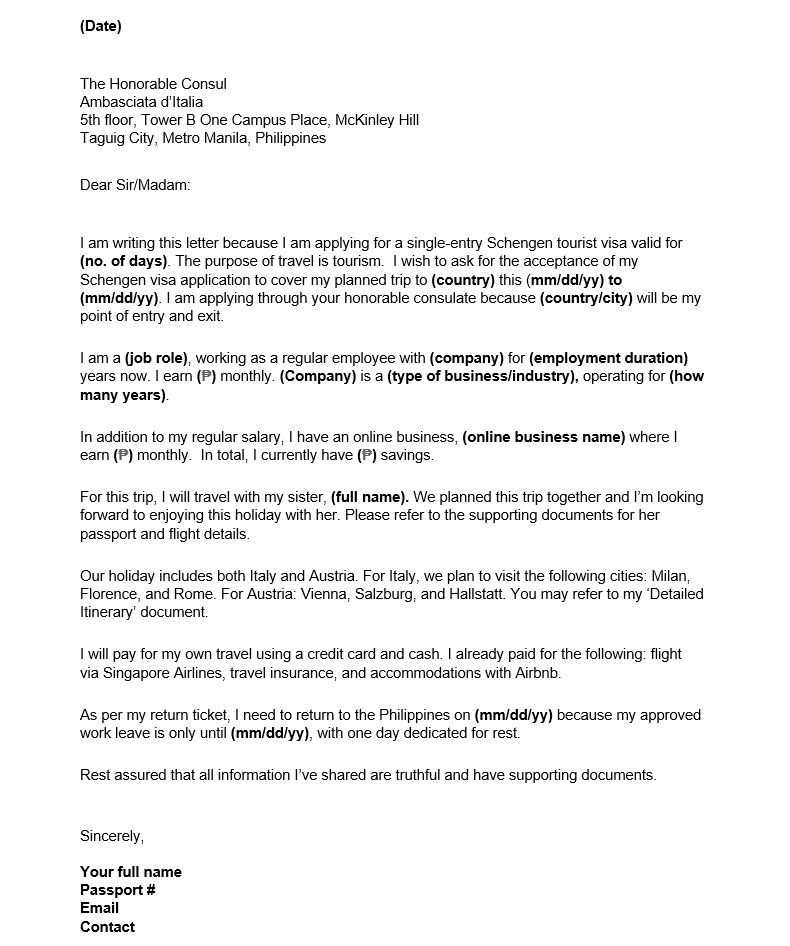[SCHENGEN TOURIST VISA COVER LETTER – ITALY VISA]

If you already know the process of applying for a Schengen visa and you’ve already prepared all the Schengen tourist visa requirements, the next step is for you to write your cover letter!
DISCLAIMER: I am not a professional travel agent and in no way affiliated with Schengen visa processing agencies. What I’ll share are guidelines and tips that worked for me. Applying for a visa is on a case-to-case basis, so nothing will ever guarantee your approval. My best piece of advice? Honesty is the best policy, always.
What is a Cover Letter?
The cover letter is the applicant’s introduction letter addressed to the embassy. It includes important details about you and your trip. This letter summarizes your entire application so it should be clear and concise.
Schengen visa application doesn’t come with interviews, so you have to rely on the cover letter to show why you’re eligible for a visa. A cover letter is your chance to tell more about the purpose of your travel or explain why you can’t submit a required document.
Cover Letter Template
If you can, try your best to fit the entire letter into just one page. Make sure that all details are relevant and straight to the point. Only include details that give value to your application. Here’s a cover letter template that you can follow:
Note that this is just a general template. You can be flexible and adjust the format however you see fit to your situation.
Date:
The Honorable Consul
[Embassy name]
[Embassy address]
[Embassy phone number]
Dear Sir/Madam:
Paragraph 1: Purpose
- Type of visa
- Countries to visit and the dates you plan to enter and exit the Schengen area
- Length of stay requested
- Purpose of travel
- The reason you’re applying thru this particular embassy
Paragraph 2: About yourself
- Job position, company, how long you’ve been working, and how much you earn monthly
- If business: what business, industry, and how long it’s been operating
- Other sources of income
- Assets: land, house, condo unit, car, etc.
- Exact amount of money in your bank account
- Travel experience (how many countries you’ve been to, any issued visa)
- Brief family background (if you have a family business, have been traveling with your family, if you have senior parents, children, or spouse, or if you’re unmarried, etc., anything relevant family-related information)
Paragraph 3: Travel companion
- Relationship
- How long you’ve known each other
- Purpose of traveling together
Paragraph 4: Travel Itinerary
- Schengen countries (or cities) you’ll visit
- Why you want to visit the country
Paragraph 5: How you’ll fund the trip
- Means of payment: credit card, cash, etc.
- Things you already paid for like hotels, trains, flights, etc.
- If sponsored: your relationship, how much money your sponsor has
SPECIAL CASES (if applicable)
- If you have someone who will sponsor your trip, describe your relationship
- In case you can’t submit any of the required documents (e.g., you don’t have an ITR), explain why you can’t and what alternative documents you’ve submitted
- If you’re traveling alone, explain why
- To establish strong ties, justify more why you should go back to the Philippines
- If you just resigned and are currently unemployed, state a valid reason
Sincerely,
[Your Name]
[Passport #]
[Email]
[Contact]
Sample Letter

5 Tips for Writing an Effective Cover Letter
1. Anticipate doubts or questions
Wear the consul hat and anticipate any doubts or questions that they might have.
For example, resigning from your job recently might raise questions on your application. So give a short explanation on why you resigned and what your future plans for employment are. If you have proof of this future plan, include it in your supporting documents. It can be a job contract with a new company or a new freelancing job.
2. Refer to the supporting documents
Whatever you write in your letter, make sure you include a supporting document to back it up.
Ask the readers to refer to your supporting documents to confirm.
For example, you can mention some countries or cities you’ll visit in your cover letter. Then refer to the “detailed itinerary” page included on your submitted documents. If the officers want to know more about the cities you’ll visit or the activities you plan to do, they would look for that page.
3. Be specific with details that matter
Be specific with important information.
For example, instead of just saying “I’m an employee”, you can write “I’ve been working with X company for 3 years now, earning xx,xxx monthly.
Just by reading this sentence, they can already see that you have a steady source of income and you work for a legitimate company. It shows that you have a job to get back to. They would know these without browsing your employment documents yet.
4. Don’t sound overly emotional
The officers are busy people. They don’t have time to read a long and wordy letter that’s too personal or overly emotional. It’s acceptable to highlight that you plan to visit Paris for the history and museums. But it’s discouraged to explain that “you’ve always dreamt of seeing the Eiffel tower and eating Parisian croissants from watching Audrey Hepburn movies”. Treat this as a business letter. Their time is important.
5. Prepare your cover letter last
Think of your cover letter as the page that ties everything together. Establish the purpose of your travel and summarize your entire application documents in just one page. This is the reason why I prepared it last, I had to make sure that I was able to cover everything that I submitted. It definitely felt like a cherry on top!
Overall, write your cover letter the same way you prepared your required documents. Have these 3 priorities in mind:
- STRONG TIES. You must have a stable life in the Philippines and you fully intend to go back without overstaying your visa. I couldn’t stress this enough. Establishing this is probably the most important thing you should focus on.
- FINANCIALLY CAPABLE. Having enough money to fund your travel to Europe and still have a comfortable amount when you get back.
- DEFINITE PURPOSE OF TRAVEL. Your travel plans must be realistic with supporting documents.
Honesty is the best policy.